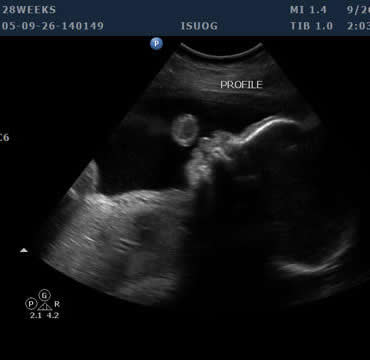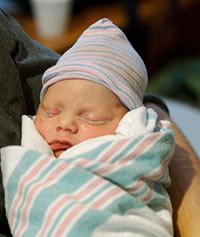Your Baby Development: 8 Weeks Old
How big is your baby? This week your baby will be weighing around 101/4 pounds and measuring 213/4 inches if he/she was of average size at birth. Your baby is already storing memories, which enables him/her to associate certain events with certain consequences. He/She will begin to anticipate certain events when given a clue, for example, he/she may get excited when he/she sees a bottle because he/she associates it with being fed. His/Her physical abilities are increasing nicely now. He/She can lift his/her head up 45 degrees when he/she is hungry, and when in a sitting position, he/she can hold his/her head up most of the time. Baby can now even focus on objects 10 feet away, and he/she will follow you when you move away. Bright colors are still favorites, and he/she may turn his/her head in the direction of a voice or sound which interests him/her. Now that baby has discovered his/her hands, he/she may examine them closely, and he/she may bring them close to his/her face. If he/she puts something in his/her mouth he/she will suck on it and his/her fingers. Baby is learning that the fingers are part of him/her, and the object isn’t.Baby Development Milestones This Week
Physical Development
- Head remains fairly erect when baby is in the sitting position, but still a little wobbly
- Cycles arms and legs smoothly
Mental & Social Development
- Can discriminate among voices, people, tastes and size of objects
- Picks out mothers voice in a group
- Repeats actions for own sake
- Watches a person alertly and directly
- Two changes of baby clothes
- 8-10 disposable diapers
- A few cloth diaper to use as bibs or burp cloths
- One resealable plastic bag containing a damp washcloth
- Baby Wipes
- Something for baby to eat, already prepared such as mixed formula
- A couple of plastic bags for soiled things
- 2-3 bottles and additional nipples
- Toys for baby
- Pacifiers
- An object which comforts baby
- A mothers first aid kit, which includes infant pain reliever, bulb syringe, diaper cream, decongestant or antihistamine, ear drops and any prescription medicines which baby may be taking.
- Don’t smoke around baby
- Keep baby off of soft surfaces, such as couches and water beds
- Breastfeed your baby
- Don’t keep your house or baby’s room too warm
- If baby sleeps in the bed with you, keep him/her near, but not too near
ead Check
He will examine the fontanel to see how it is closing, and he will measure baby’s head and record it on his/her growth chart.
Eye Check
he will examine to see how his/her pupils dilate. He will also check for any vision problems and eye movement by moving a light in his/her visual field.
Mouth Check
An examination of his/her mouth will reveal any problems, such as infections. He will also check for any signs of teething.
Nose Check
Looking into baby’s nostrils will reveal signs of infections, as well as examining the nasal passages for any signs of abnormal development which could interfere with breathing.
Ear Check
You pediatrician may do some tests to check baby’s hearing and he will check for any signs of a possible ear infection.
Abdominal Check
Feeling baby’s abdominal area may reveal any abnormal growths or enlarged organs. He may ask you questions about feeding routines, bowel habits etc.
Chest Check
Examining Baby’s heart and lungs is important. He will check for abnormal sounds or rhythms. He will also examine baby’s lungs to listen for any signs of infection or breathing difficulties.
Legs Hips and Feet Check
He will rotate baby’s legs to check for any signs of a dislocated hip, and he will examine the legs and feet for proper development.
Genital Check
Your pediatrician will check baby’s genitals for any signs of unusual symptoms or infections. With a baby boy he will check that the circumcised penis has healed properly, and he will also check the testicles.
Baby’s Development Check
Your doctor will ask about your baby’s development, and will cover physical, mental and emotional development. Your observations are an important part of this assessment.
Diet and Sleep Check
Your pediatrician will ask questions about how your baby is sleeping and eating.
Playing not only helps to develop family bonds, but it also helps your baby develop mentally and physically.
Baby Week8


